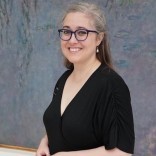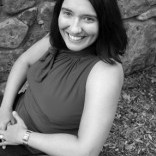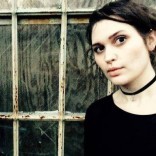Care Taking
Kalila Holt
A few times every year, Wren’s mom decides they should live somewhere else. Wren used to get really excited. She used to jump up and down until her feet stung. She used to make up songs with names like “We’re Going to Seattle.” She would sing the songs for Mrs. Kimball, the old woman next door that she stayed with while her mom went to check out their new home. But whenever Wren’s mom came back, she’d just get sort of quiet for a couple days, and then she’d say that Orlando or St. Louis or Las Vegas was actually not the place for them after all.
This last time, two months ago, was different than the other times, because this time Wren had to stay with her Uncle Chris and Luther in New York City. And also because this time she did not make up any songs and her feet did not sting because Wren knows they’re not going to Seattle, there’s no way they’re ever going anywhere, because she’s ten years old now and they still haven’t left dumb Connecticut.
2. The word “psychopath.”
Which Wren looked up after everything with Amanda Reed and the dying bee and the sandwich. It basically means that you can’t love anyone and you don’t ever understand the right thing to do. After Wren looked it up, she listened to the ocean in her hand for a long time.
Amanda’s mom had shouted “psychopath” at her that day when Wren had to go to the office. She spit on Wren a little when she said it, but Wren’s pretty sure she didn’t mean to.
3. The way my mom reacts when I have to flail my arms and make a noise, or bite down extra hard on my lip so that the skin gets white.
This is something Wren sometimes needs to do when her chest starts squeezing. The squeezing makes her wish she could just throw up everything inside of her, her heart and her lungs and her stomach. But she can’t, so she flails instead.
One of Wren’s mom’s favorite things to say when Wren does this is, “Oh, preteen hormones…” Another is, “Just wait. When you’re older and you have some perspective, you’ll laugh at the things you used to get upset about.”
“I wish you would stop saying that because I’m basically an adult at this point,” Wren once told her. Her mom just started laughing really hard. She kept gasping for air. Wren thought she was really exaggerating how hard she was laughing. “I’m serious,” Wren told her. “Just cuz I don’t know what some words mean yet doesn’t mean I’m a baby. I understand adult things. I know about sex. And death.”
“Oh, god, Wrennie bird,” her mom said. She wiped at her eyes, like she was crying because Wren was so funny. “For one thing, your awareness of death is so much different when you’re older. You don’t realize yet that you’re going to die.”
“Yes, I do,” said Wren. “Everyone dies, and it could happen at any time. Then you get a bunch of chemicals in you and you go in the ground and eventually worms eat you.”
“You say that,” Wren’s mom said, “but you don’t really feel it, Wren. You still feel invincible.”
“I do feel it,” Wren said.
“Well,” her mom said, “you will.”
4. I have to stop listening to the ocean in my hand.
Which, along with the flailing and the lip biting, is another thing Wren sometimes needs to do to stop the feeling. But when Wren did it in class, Mrs. Thomas said, “Wren, pay attention or I’ll have to send you to the office,” and when she did it at lunch, Amber said, “Why is your hand like that, are you ignoring us?” and Wren said, “No, I’m listening to the ocean,” and Marsela said, “Oh-kayyy…” like maybe Wren was stupid and just hadn’t figured it out yet.
Maybe it doesn’t matter. In the car on the way to school yesterday, Wren realized maybe her hand doesn’t sound so much like the ocean anyway. Maybe it just sounds like highway noise.
5. The Holocaust.
Which Wren learned about in history.
6. Luther has a really rare blood type but they won’t let him donate blood even though he really wants to.
“I don’t get why, though,” Wren told him. This was at the drugstore, where they’d gone to get some bubblegum.
Luther chewed gum all the time. Wren asked Luther for some when she first started staying with him and her Uncle Chris, but Luther laughed and said it wasn’t that kind of gum. “It’s not what kind of gum?” Wren asked.
“The kind you share with pretty girls named Wren,” he said, and Wren laughed, because it wasn’t what she was expecting and because she knows she’s not pretty.
So they went to the drugstore to get some Wren gum, and there were signs for a blood drive, and that’s when Luther told Wren about his blood type and everything. When Wren said she didn’t get it, Luther just sort of froze for a second. They were in front of the school supply aisle. His mouth was open like he was going to say something. Then he did say something: “Yeah, you know, I don’t really get it either.”
7. I got sort of behind while I was staying with Luther and Uncle Chris.
For a lot of stuff, like reading and history, it didn’t matter, because that stuff is always the same. But for math, you have to keep using the old stuff to do all the new stuff, which is why Wren was so worried about leaving before the unit on multiplying and dividing fractions. Now Mrs. Thomas keeps pulling Wren aside in class to do stuff that everyone else has already done. Wren knows it’s not because she’s stupid, but she kind of feels like it’s because she’s stupid.
8. Uncle Chris tried to help, but it didn’t help.
Wren told her mom she was worried about fractions in the car on the way to New York, and then when they got there, Wren’s mom told Uncle Chris. She whispered it, but in a fake way, like she wanted Wren to hear her.
Once Wren’s mom had left, they ordered a pizza, and Uncle Chris tried to explain fractions by cutting up the pizza. “See, Wren?” he said. “I’m cutting the pizza into two equal slices, so each slice is a half. One over two, because it’s one of two slices.” Wren didn’t tell him that she’d learned what fractions were in second grade, and that now they were learning stuff in math class that couldn’t be explained by a pizza, probably. She didn’t tell him because she could tell he was trying really hard, and because he was smiling even though Luther had yelled at Wren’s mom about her “infantile behavior” (which Wren looked up, and which means babyish). Probably neither one of them even wanted Wren there. She just nodded and she even ate the pizza, even though it was pepperoni and she’s trying to be a vegetarian.
But she got that twinge-y, pretending feeling about the whole thing, and when she looked across the table at Luther, she wondered if he knew. She felt like maybe her eyes were saying, “I’m pretending!” Wren knew almost nothing about Luther at that point. Only the gum and the yelling and his name and that he was in love with her Uncle Chris.
That night in bed, Wren listened to the ocean in her hand, and also cried some, which is pretty infantile. Someone pushed open the creaky door to the office, which is where she was sleeping, on the floor on an air mattress. The person crouched down next to her. Whoever it was didn’t turn on the light, and there were no windows in the office, so until they said something Wren didn’t know if it was Luther or Uncle Chris or her mom coming back for her or maybe a crazy murderer.
It was Luther. “Homesick?” he asked.
“No, not really,” Wren said. She sat up and tried to stop crying so she wouldn’t look lame. “I’m sorry if I woke you up. I tried to be quiet.”
“You didn’t,” he said. “I have insomnia anyway.”
“Oh,” Wren said, even though she wasn’t sure what that meant. (When she looked it up, she learned that it means “difficulty in falling or staying asleep.”)
No one said anything for a while and Luther seemed like he was about to leave but then Wren said, “I’m a vegetarian,” and that made her start crying all over again.
“I’m sorry,” Luther said. He gave her a hug.
9. The word “pedophile.”
Which Wren also looked up, and which means an adult who wants to have sex with kids. Wren feels she’s pretty well informed about sex, because they had a whole unit about it at school this year. She already knew about sex before that anyway, about the different parts and the staring at each other naked and how you’re supposed to love the person and how it really hurts.
“Pedophile” is a word Amber used at lunch one day. Wren told her and Marsela about how she has to meet with the guidance counselor, Mr. Cooper, twice a week now. It’s because of the whole Amanda Reed thing.
“That sucks so much,” said Marsela.
“Yeah, completely,” said Amber. “Like, you have to sit in some room with this pedophile asking if you feel bad and stuff? It’s super creepy.”
Marsela giggled. “Oh my god, you’re so right,” she said. “He’s totally a pedophile. Don’t you think, Wren?”
And Wren didn’t know what a pedophile was, but they were both looking at her, so Wren just said yes, and they both giggled again, and Wren giggled too.
A week later, Wren was trying to explain to them how Mr. Cooper says she’s a “troubled soul,” and about the list she has to make and everything, and she could feel her giggling rights slipping away, so she just said, “He’s such a pedophile,” even though she knew what it meant by then. She doesn’t think it’s true, not even a little bit, but after that Amber French-braided Wren’s hair for her, and Wren didn’t even have to ask her to do it.
10. I’m afraid I have to leave Mrs. Kimball as my computer background forever.
Wren made Mrs. Kimball her background right after she died. Wren figured it was the right thing to do, since Mrs. Kimball let Wren stay with her so much and made her ice cream sundaes and watched “Wheel of Fortune” with her. Her house didn’t even smell that weird, like a lot of old people’s houses do. It only smelled a little weird, probably because of Mrs. Kimball’s cat.
The picture is of Mrs. Kimball wearing a hat with a chicken on it and smiling really big. It seems good to Wren to have a picture like that, because when Mrs. Kimball’s son came for the funeral, he was all suited and serious and probably didn’t even know how much fun his mom was. He wouldn’t take the cat home with him, either. When Wren asked him about it, he just kept frowning and saying he was allergic. Wren asked if she could take the cat because she thought maybe it was the right thing to do, but he said he’d already dropped it off at a shelter, and Wren wasn’t sure she wanted a cat, anyway.
It’s been several months now, so Wren was going to change her background to a picture of the moon landing, which she learned about in history. But then she couldn’t do it. Wren doesn’t believe in ghosts or angels or the afterlife or anything, and she knows Mrs. Kimball is dead forever, but she still felt guilty about it, like Mrs. Kimball would find out somehow. So she dragged the moon picture into the trash. It’s not like Neil Armstrong ever made her an ice cream sundae.
11. I don’t know my dad at all and now he has a new family with new kids.
Wren knows this because he sent her and her mom a Christmas card with a picture of his new family on it. Him and a woman with short gray hair and glasses and a baby that looks like it might cry and a teenage girl with her arm thrown around Wren’s dad. Also their rabbit, whose name is on the Christmas card as well—Rumble. Wren’s mom threw the card away, but she didn’t cover it up at all in the trash, so Wren still saw it.
12. I read in a book that when the Communists took over Russia, they went to the country and they melted down the church bells to take the metal. All the peasants were crying while they were taking the bells away, because they thought the bells were God’s voice on Earth.
13. What if Luther secretly hated me the whole time?
When Wren first showed up, he said he didn’t want her there. He said it to her mom when Wren was in the bathroom, so he thought she couldn’t hear him, but she could because she pressed her ear against the door and dried her hands in super slow motion. At least, she could hear pieces of him, and mumbles in between. “Annie,” he said, which is Wren’s mom’s name. “There’s no way we’re taking her. … not obligated … … … just show up and drop … … … infantile behavior. Do you hear me? You’re being infantile … unfair, because you know Chris is too … …—”
Wren’s mom cut in. “… work from home?”
“That’s completely besides the point!” Luther said. “… … … .”
Wren’s mom again. “… to not have a kid for a little while. … my sanity … family.”
Luther. “No, family bothers to … … … … that your own brother’s gotten married … … … attention at all?”
Wren decided to come out of the bathroom then. “We did send you an invitation,” her Uncle Chris was saying. Then they noticed Wren was there, and they all froze and smiled in the exact same way.
“Hello,” Wren said.
14. Fire drills.
Fire drills can happen at any time. The alarm is really loud and startling. Sometimes in class, Wren starts to wonder if there’s going to be a fire drill that day and then she can’t concentrate. She asked her mom if she could stop going to school and be home schooled, since there are no fire drills at home. Obviously her mom said no, because Wren’s still here.
15. I didn’t know Amanda Reed was allergic to bees or that they’d have to call an ambulance or that I was “putting her on her deathbed.”
Wren never would have done it if she had, no matter how much Marsela and Amber raised their eyebrows and whispered hissy things to each other. Wren doesn’t even care that Amanda pulls her socks so high and stutters and has a rolly backpack. And she didn’t care about the dumb cookie Marsela gave her either, even though when Wren had to go to the office, Amanda’s mom brought the cookie up seven times, like it Wren’s entire motivation for putting the dying bee in the sandwich at all. “My daughter could have died, for a cookie?”
The cookie wasn’t even that good. It was sort of hard. Marsela said it was from a famous French bakery. Wren’s not sure she ever needs to go to France.
16. I eat a lot of snacks late at night.
“It’s not a problem now,” Wren’s mom told her, “but it will be when you get older and your metabolism slows down.” Then she dug through a box and found a picture of a distant relative who’s really fat. She smiled.
17. I threw up on the rug my dad gave my mom back when they were still together.
Wren was eating a bunch of kettle corn while spinning really fast in their office chair and she got sick. After she threw up, she cleaned the rug herself. She’s not sure if her mom has noticed the stain.
The rug looks like it’s made of a bunch of little pieces of other rugs, fancy ones, like the rugs a king might hang on a wall. If you lift one of the corners of the rug, you can see this fortune cookie fortune that someone sewed into the bottom. It’s gotten a little grayish, and the writing is starting to rub off, but sometimes Wren still likes to look at it. “Good things are headed your way,” says the fortune.
18. My mom smiles ALL THE TIME.
Even when she probably shouldn’t smile and another person would make more of an effort to look a little bit sad or serious or worried. She smiled when Wren told her about the fire drills, she smiled when she talked about Wren dying, she probably even smiled when the office called her about Amanda Reed. “Be sadder!” Wren told her once. She wanted to shout it, but instead she just sort of whispered it, so her mom didn’t really hear her.
“What was that?” Wren’s mom asked her, smiling.
And Wren just said, “Nothing,” because
19. What kind of daughter wants her mom to be sad?
20. The New York City subway.
Which Wren had to ride when she was staying with Luther and Uncle Chris. Uncle Chris told her not to touch the walls because people pee on them, and a lot of times Wren would see rats running all over each other.
Sometimes homeless people came onto the trains and shouted stories about how bad everything was and asked for money. Luther told Wren not to look at them. Once a guy with an eye patch got on and stood right next to Wren.
“Be grateful for what you have, ladies and gentlemen!” he shouted. “Because remember, any of you could become homeless at any time! You could lose that job, or your house could burn down!
“I lost my left eye,” the homeless man said. “I was mugged and stabbed. I will show you so that you know I’m telling the truth.” He lifted up his eye patch. Wren looked even though she wasn’t supposed to. He was telling the truth.
21. During the month I was staying with Luther and Uncle Chris, it seems like Marsela and Amber got even more togethery.
The first day Wren got back, she counted five new inside jokes they wouldn’t explain to her. When Wren tried to tell them about New York and an interesting exhibit she’d gone to about James Garfield, Marsela pretended to shoot herself in the head. “God, Wren, you were in the most exciting city in the world and all you have to talk about is like, the Revolutionary War? What about, like, SoHo?”
Wren did go to SoHo, actually, once, and everyone was very packed together and kept tripping on her and most of the stores were the same ones as in Connecticut, anyway. In the street, some man started yelling at another man. He said the other man had “bumped him.” The angry man kept shouting, “Are you blind?” and the other man would just mutter. He seemed disoriented. Then cars started honking. Wren doesn’t really get what makes SoHo so much better than James Garfield.
“It’s actually not the Revolutionary War,” said Wren. “James Garfield was our 20th president.”
Marsela made this spitting sound and Amber muttered, “Oh my god…”
22. The last time I stayed with Mrs. Kimball, she woke me up in the middle of the night and told me my mom was on the phone.
“I told her to just call back in the morning,” Mrs. Kimball whispered, “but she insisted.”
Wren talked to her mom in bed, with the lights out and the covers still tangled and hot. “Wren,” her mom said. “Wrennie.” She kept laughing. Wren could hear the TV on extra loud in the background.
“Hello,” Wren said.
“I just needed to call and talk to you, okay? Wren. You know I’m not going to abandon you, right?”
“I know,” said Wren. She wanted to go back to sleep. Her brain felt fogged over.
“I’m not your dad, I’m not. I only leave for a little bit. Just a little bit and then I come back.”
“I know,” Wren said.
Mrs. Kimball stood in the corner the whole time Wren was on the phone. When Wren hung up and handed the phone back, Mrs. Kimball squeezed her shoulder and told her that she was a good kid. Wren didn’t know what to say, so she didn’t say anything.
23. Uncle Chris is always telling these sad stories from all these different parts of his life.
It’s not like he was ever in a war or an earthquake or anything. Only two of the stories Wren heard had to do with hospitals. But he always told them slowly to the wall, and after he was done, he always looked at his hands and everyone was quiet for a while. Once the three of them were sitting at the kitchen table drinking tea, and Uncle Chris went, “When I was in kindergarten, we all got goldfish. We went on a field trip to the pet store and carried the fish back to school, where we put them in plastic bowls. We got to write our fish’s name on its bowl in marker. My fish was named Wavey. I spelled it wrong, with an extra ‘e.’ We put our fish on top of our lockers. They told us we could get them at the end of the day. Well, when I came back, all excited to bring Wavey home, he was dead. Everyone else’s fish was still alive. I cried and cried, until a little girl in my class told me, ‘You’re only crying down to your chin. When my dad died, my tears went all the way down to my knees.’ What are you supposed to say to that as a five-year-old?” That was the end of the story.
Luther never told stories like that. He never really told any stories at all. Still, Wren thinks sad things have probably happened to him too, because once Uncle Chris asked, “Wren, is there anyone you have a crush on?” and Wren said, “There’s a boy I like, but he doesn’t like me back,” and Luther said, “Story of my life.” He laughed, but not like anything actually funny was happening.
24. Jackson Hartley
Jackson Hartley has holes in his long-sleeved shirts that he sticks his thumbs through. He answers a lot of questions right in history and once gave Wren a piece of the dried mango he had in his lunch. He’s caught Wren staring at him ten times in the past four months. Usually he doesn’t say anything, but once he mouthed, “What?”
Sometimes Wren realizes she’s really happy, and then when she tries to figure out why, she remembers it’s because of a made up conversation with Jackson she had in her head. Then she stops being so happy.
Once Wren’s class was playing dodgeball in gym, and after Jackson got out and went to sit on the side, Marsela and Amber cornered him and told him that Wren thought he was cute. Wren got distracted watching them and a ball hit her really hard in the shoulder. Later, she asked them what he said. “He said, ‘Okay,’” Amber told her. Wren’s shoulder stung for the rest of the day.
25. I keep getting mad at Amanda and the bee.
Wren gets mad at Amanda for needing to use the bathroom right then, and just leaving her PB&J on the table with the tinfoil already unwrapped. She gets mad at the bee for lying on the windowsill and dying all slowly in such a noticeable place, instead of somewhere out of the way. Then she gets really mad at herself for getting mad at them.
26. Sometimes when I get the feeling that I need to flail something out, I can’t even tell why.
They were eating dinner and Uncle Chris told another story. “I was driving with your mom a while back, Wren, when she was pregnant with you. Years ago. We were driving a moving truck from Indiana, where we grew up, to Connecticut, where your dad lived. I told her I’d help her move. She was so excited. She’d never been out of Indiana, you know. When we were growing up, she always talked about how much she wanted to travel, but she never did. And then when she got pregnant, she thought she’d never get the chance. And then your dad said he’d marry her, asked her to come to the east coast, and it seemed like she’d been wrong. Anyway, your mom was driving, and I was falling asleep when I heard a thud. So I startled awake, just in time to see that a bird had flown smack into our windshield. Your mom was in hysterics. She was crying and made us pull over, right there on the highway. She wanted to run back into the road to get the bird’s body, but I told her she couldn’t, she’d get killed. ‘It’s not your fault,’ I told her. ‘Why do they fly so low?’ she kept asking. ‘Why do they do that?’ I took over driving, and the whole rest of the way to Connecticut, she just kept asking me, ‘Why do they fly so low?’ The bird she hit was a wren. And by the time we got to your dad’s, she decided she would name you Wren, to honor the bird’s life.”
Chris’s fork clinked against his plate.
“Excuse me,” Wren said, and she ducked around a corner and bit her lip so hard it bled, just a little bit, and flailed her arms. She didn’t make a noise, though. She didn’t want them to know she was right there, behind the wall.
“What the fuck, Chris?” asked Luther, kind of whispering, and Uncle Chris sounded dazed and he said, “What? What did I do?”
After that, Wren tiptoed down the hall and then tried to walk very loudly back towards the kitchen. She sat back down again. “Oh no,” said Luther in this exaggerated voice, “I stepped on an ant. I guess I better name my kid Ant,” and he glanced at Wren to see if she would smile, so she did.
Wren couldn’t sleep that night, and she thought Luther might be up because of his insomnia. He was. He was smoking a cigarette in the kitchen. The lights were out and Wren could hear sirens on the street. He got some cookies for her to eat and Wren showed him how you don’t even need a shell to hear the ocean, how really, you can just cup your hand to your ear. “So it’s kind of like everyone has the ocean with them all the time,” she told him.
“That’s amazing,” said Luther, and he reached over to hold her hand with his non-cigarette arm. “Don’t tell Chris about the cigarette, okay? I’ve been trying to quit.”
“Would he be mad?” Wren asked.
“No… No, he wouldn’t be mad… I don’t know. It’s just… sad. Something that shouldn’t have happened.”
“Don’t hate Uncle Chris because of the bird story, okay?”
“I don’t hate him,” said Luther. He laughed, but not really. “Same thing. It’s just something that shouldn’t have happened.”
“The story? Or him telling it?” Wren asked.
He blew out some smoke and didn’t say anything. He was thinking, maybe. “Both,” he said finally. They listened to a car alarm go off.
“Your mom’s been gone a long time now,” Luther said. “I thought she’d be back already.”
“Yeah,” Wren said.
27. Mr. Cooper told me not to leave anything off the list, even if I think it’s stupid. That I’m just supposed to give a complete picture of how I’m feeling. But to not leave anything off, I would need infinite notebooks and infinite pens and infinite time, probably. Instead I have to go to math class.
28. When I left, Luther said, “Take care of yourself.”
Wren knows it’s just a thing people say, and he kissed her on the head when he said it. But she still felt weird about it. What does that mean exactly, “Take care of yourself?”
29. When we got back from New York, there was a moving truck outside our house.
And for a second, Wren thought that maybe this time they really were moving after all. Then she felt stupid. The movers were taking stuff out of the truck, not putting it in. Plus, the stuff obviously wasn’t theirs—Wren and her mom don’t have a little Barbie car or a tandem bike or a teal mini fridge. And the truck was really in front of Mrs. Kimball’s house, not theirs.
Their new neighbors are named the Nelsons, and their Barbie car is ripping up Mrs. Kimball’s lawn.
30. I thought we might all live together.
Because Luther asked about it. “How’d you like to just live in New York?” he said. “With us. Me and Chris.”
“What about school?” Wren asked.
“You’d go to school here,” he said.
“Would I have to take the subway?”
“Yeah. We’d teach you, though.”
“Okay. That sounds good,” Wren said, and Luther kissed her on the head.
Seems like he was just talking, though, because the next day Wren’s mom showed up to take her back to Connecticut, and no one tried to stop her or anything.
31. While my mom and I were driving back to Connecticut, a bird swooped down right in front of our car.
Wren thought they were going to hit it for sure, and her heart started beating really fast, but it flew out of the way just in time. Wren should have felt better but didn’t. She looked over at her mom, but her mom hadn’t even noticed. She was gazing out the window, humming to herself. Wren had been thinking about all kinds of things that she wanted to ask her, but she didn’t ask any of them and she still hasn’t. Instead, while her mom was humming and not noticing, Wren stared at the spot on the windshield where they did not hit a bird.

















